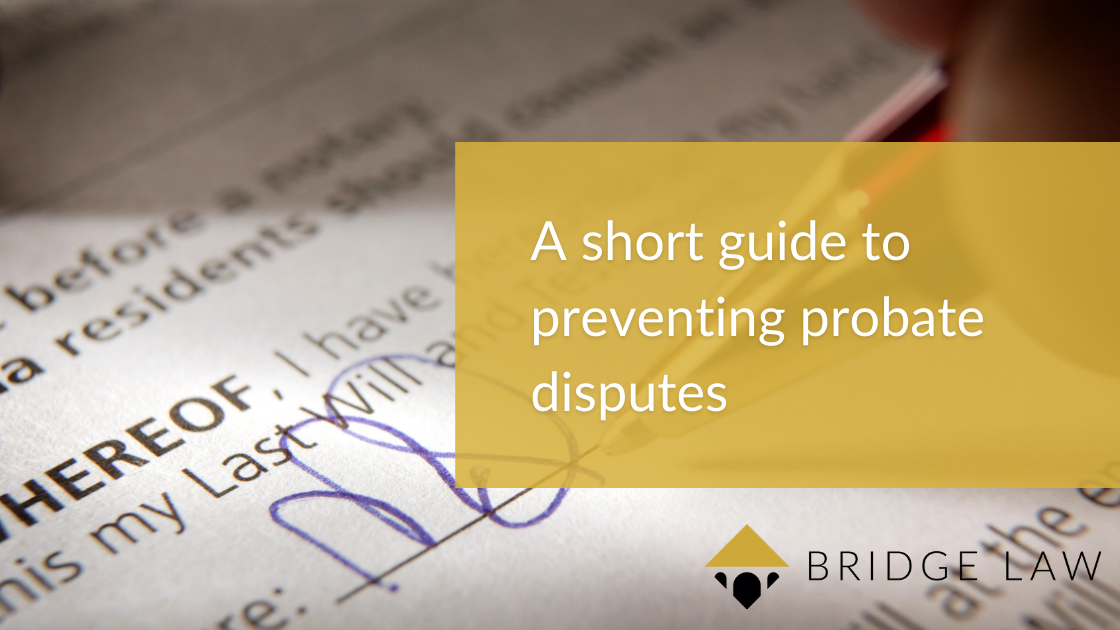A short guide to preventing probate disputes

In recent years it has been widely publicised that contentious probate cases are on the rise. In this blog, we share some of the common reasons why Wills are left open to being contested and what you can do to help prevent a dispute after you pass.
Why make a Will?
Firstly, it’s important to understand why you should make a Will. Many of us put off making a Will, often due to it being a difficult topic to think about or because we think we’re too young to need a Will, or that we think our wishes will be met under the Intestacy Rules.
However, probate is a complex area of law and every adult should consider making a Will that clearly sets out your wishes, especially if you have any substantial assets, property, own a business, have caring responsibilities, children, stepchildren, grandchildren or an unmarried partner.
The intestacy rules are fixed and don’t consider your personal circumstances. In some situations, the rules can even lead to people you don’t even know or sometimes even the Crown profiting from your estate. Proper estate planning can also minimise the amount of inheritance tax payable from your estate.
Having a clear, valid Will in place can help make the probate process easier and prevent disputes, which can avoid your loved ones having to go through any additional emotional turmoil at what will already be an upsetting time.
Common reasons Wills are contested
Wills can be contested for many reasons, in recent years the number of clients needing advice and assistance on contentious trust and probate cases has been rising. In our experience, many of these cases have common factors involved.
When writing a Will, it is important to consider all the people involved in your life who may have a claim to your estate, whether it’s closely related individuals you’re estranged from or those you consider your nearest and dearest that you’re not biologically related to. It’s vital within a Will that you do not assume those administering your probate will know what you mean and everything included should be set out in as clear terms as possible.
Below we’ve listed some of the factors that have led to Wills being disputed, which you should consider if they may be something that could leave your future Will or existing Will open to scrutiny after you pass.
- Will has been invalidated due to improper execution (signing and witnessing) – this is something we are seeing more and more of with the increasing number of individuals making Wills without professional advice or making online Wills that don’t consider factors that may very easily make a ‘straight-forward’ Will more complicated.
- The testator’s (the individual the Will belongs to) capacity to make a Will was questionable. This is partly why proper execution is so important to identify if a Will was made prior to losing capacity.
- The testator had been unduly influenced (coerced into making the Will to suit someone else’s interests).
- It is suspected the Will had been written and signed fraudulently.
- The testator had a ‘blended’ family and did not clearly set out their wishes. For example who they were referring to as their children (e.g. the testator thought of their step-children as their own, but only referred to ‘my children’ in the Will, causing a dispute between the biological and step-children).
- The testator did not provide specific provisions within the Will for their unmarried partner to remain in the property they owned as they assumed they had the same entitlement as a married partner due to living together for many years.
- The testator did not explain why they had left out specific individuals from their Will that would normally have a claim to the estate (e.g. an estranged child, sibling, parent etc).
- The testator did not make a new Will after separating from their partner or spouse and the ex had therefore in the Will gained a substantial amount from the estate.
- The Will did not appropriately deal with business ownership, business debts or assets e.g. said something different to the deed of partnership, shareholder agreement or articles of association.
- The Will did not provide provisions for if the beneficiaries had also passed prior to or on the death of the testator.
How to prevent your Will from being open to disputes
As well as considering all the factors in your life to determine what you should include in clear terms within your Will, there are a number of other steps and precautions you can take to help prevent the likelihood of your Will being disputed after you pass.
- Get professional advice and assistance when writing your Will – to ensure all bases that you may not even think of are covered and ensure your Will is validly executed.
- Many professionals, including solicitors, are required within their code of conduct to keep notes of your matter, which should provide clear evidence of your wishes and their assessment of your capacity etc. They can also note down more details to back up any issues you suspect may arise e.g. why you have written someone out of your Will etc.
- Make your loved ones aware of your wishes and where your Will is stored. Consider storing with a professional facility, as only the original document is valid and they are easily lost or damaged in the home. This can also help prevent becoming a victim of fraudulent Wills. Read more about the importance of Will and Powers of Attorney storage here.
- If you have appointed guardians for children, make sure you have discussed this with the guardians and other close family members.
- Updating your Will when your circumstances change, for example, if you’ve gained/lost wealth or assets, got married, divorced, separated, had children or new grandchildren, previous beneficiaries have passed away or become estranged and more.
- If you also have a business, make sure your Will aligns with the appropriate information in your business documents e.g. articles of associations, partnership/shareholder agreements etc.
Although we cannot guarantee your Will won’t be disputed, these steps can make it easier to defend a dispute and prevent those disputing from gaining a share of your estate. In some situations, with a clear enough Will and evidence to back up the Will, the person disputing may also instantly be advised they have no merits in their dispute and decide not to take it further.
If you need further advice on a contentious trust and probate matter or help with making or updating an existing Will, contact us to speak to a specialist solicitor.
Written by Claire Stewart

contentious probate, Contentious trust and probate, Probate dispute, Will dispute, Will Writing
